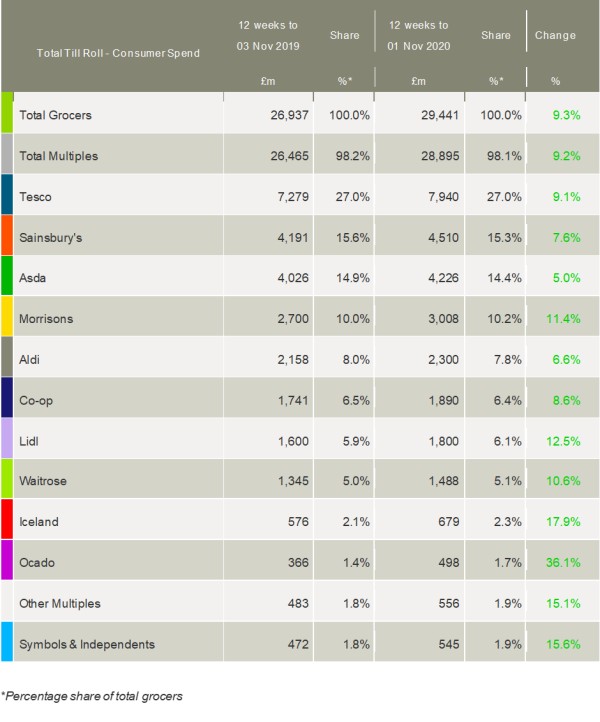Despite much of the country entering a second lockdown, latest grocery market share figures from Kantar suggest there hasn’t been a significant spike in demand for food in supermarkets as seen back in March. Total take-home grocery sales rose by 9.3% during the 12 weeks to 1 November, with growth edging up to 9.4% in the most recent four week period.
Wales did see a slight pickup in sales growth (+15% in the last month) as shopper habits were impacted by the strict firebreak lockdown. However, Kantar said early evidence suggested that consumers in England are confident about getting the essentials during the new lockdown even if the restrictions impinge on festive shopping.
Fraser McKevitt, head of retail and consumer insight at Kantar, said: “While there was some uplift in Wales, the increased spending did not provide any evidence of stockpiling, and initial figures suggest no sign of panic buying in England either. But one thing is always front of mind at this time of year – Christmas – and it seems many people sought to get ahead with gift buying before stores closed. Between Monday-Wednesday last week, the three days before additional nationwide restrictions were introduced in England, toy and entertainment stores took more than double their share of pre-covid footfall, and shoppers rushed to gift shops and fashion retailers.”
Meanwhile, sales of premium own label products were up by £56m over the last month. The category usually hits its peak in December, suggesting that this could be an early indication of more to come as we approach what is likely to be an unusual Christmas.
Kantar highlighted that frozen food, which has been the hot ticket since the beginning of the pandemic, remains in high demand with sales rising by 14% in the latest 12 weeks. Iceland has benefited the most from the trend, helping to grow its market share to 2.3%, from 2.1% last year. Overall, the retailer’s sales were up by 17.9% over the period, with shoppers also spending more in Iceland’s chilled and ambient aisles. This meant that the average spend per trip at Iceland was worth 44% more than in 2019, the greatest increase of any retailer.
Amid surging demand for online grocery services, Ocado was again the fastest-growing retailer, with sales up by 36.1%.
Meanwhile, Waitrose grew ahead of the market, by 10.6%, and its share rose for the first time since 2017 to 5.1%. The upmarket retailer increased its online sales faster than any other grocer this period.
Morrisons led the Big Four, growing sales by 11.4%, and expanding its share for the fifth month in a row. It now accounts for 10.2% of sales, helped by its The Best premium own label brand, which grew by 42%.
Sainsbury’s sales rose by 7.6% this period and its market share currently sits at 15.3%. The retailer recently announced it would permanently close its fresh food counters, a move which reflects a market-wide drop off in the number of people using in-store butchers, delis, and fishmongers. McKevitt commented: “The number of supermarket trips involving a visit to the delicatessen, meat, or fish counter has fallen by 33% in the past 12 weeks, with many operations suspended because of the pandemic. But that doesn’t mean shoppers are snubbing unpackaged, fresh products altogether. In fact, the first national lockdown saw record numbers of people buy meat from other sources. Over two million households have visited their local butcher in the past three months, 100,000 more than this time last year.”
Asda’s performance remained lacklustre compared to its rivals with sales increasing by 5.0%. Tesco, which grew by 9.1%, maintained its share at 27.0% and had success through both physical and online sales.
Lidl remained the best performing discounter with its growth accelerating to 12.5% and market share up to 6.1%. Aldi’s sales rose by only 6.6% and its share fell slightly to 7.8%.
Co-op increased sales by 8.6%, but its market share dipped to 6.4%, while independent retailers grew their share of the market to 1.9% after sales grew by 15.6%.
Kantar’s data showed that grocery inflation stood at 1.9% for the 12-week period with prices rising fastest in categories such as canned cola, ice cream and sausages while falling in vegetables, bread and rice/noodles.

NAM Implications:
- As always, key is how your sales compared with each of the main players reporting.
- As we approach ‘an unusual Christmas’ says it all…
- Suppliers obviously cannot afford to await the next syndicated results…
- …to discover what they should have done…
- i.e. time to take an informed guess, and stick with it!




